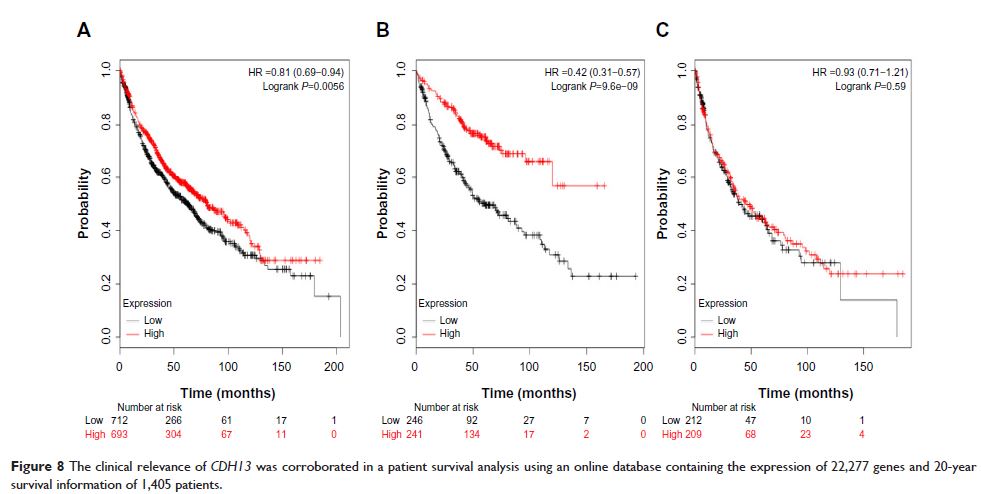109229
论文已发表
注册即可获取德孚的最新动态
IF 收录期刊
- 3.4 Breast Cancer (Dove Med Press)
- 3.2 Clin Epidemiol
- 2.6 Cancer Manag Res
- 2.9 Infect Drug Resist
- 3.7 Clin Interv Aging
- 5.1 Drug Des Dev Ther
- 3.1 Int J Chronic Obstr
- 6.6 Int J Nanomed
- 2.6 Int J Women's Health
- 2.9 Neuropsych Dis Treat
- 2.8 OncoTargets Ther
- 2.0 Patient Prefer Adher
- 2.2 Ther Clin Risk Manag
- 2.5 J Pain Res
- 3.0 Diabet Metab Synd Ob
- 3.2 Psychol Res Behav Ma
- 3.4 Nat Sci Sleep
- 1.8 Pharmgenomics Pers Med
- 2.0 Risk Manag Healthc Policy
- 4.1 J Inflamm Res
- 2.0 Int J Gen Med
- 3.4 J Hepatocell Carcinoma
- 3.0 J Asthma Allergy
- 2.2 Clin Cosmet Investig Dermatol
- 2.4 J Multidiscip Healthc

已发表论文
CDH13 甲基化和非小细胞肺癌 mRNA 的预后意义
Authors Xue R, Yang C, Zhao F, Li D
Published Date October 2014 Volume 2014:7 Pages 1987—1996
DOI http://dx.doi.org/10.2147/OTT.S67355
Received 7 May 2014, Accepted 9 June 2014, Published 31 October 2014
Abstract: Aberrant methylation of CpG dinucleotides is a commonly observed epigenetic modification in human cancer. Thus, detection of aberrant gene promoter methylation as a tool for diagnosis of tumors or as a prognostic marker has been widely described for many types of cancers, including nonsmall cell lung cancer (NSCLC). Emerging evidence indicates that CDH13 is a candidate tumor suppressor in several types of human tumors, including NSCLC. However, the correlation between CDH13 hypermethylation and clinicopathological characteristics of NSCLC remains unclear. In the current study, we conducted a systematic review and meta-analysis to quantitatively evaluate the effects of CDH13 hypermethylation on the incidence of NSCLC and clinicopathological characteristics. Final analysis of 803 NSCLC patients from eleven eligible studies was performed. CDH13 hypermethylation was observed to be significantly higher in NSCLC than in normal lung tissue, with the pooled odds ratio (OR) from seven studies including 448 NSCLC and 345 normal lung tissue (OR, 7.85; 95% confidence interval, 5.12–12.03; P <0.00001). CDH13 hypermethylation was also associated with pathological types. The pooled OR was obtained from four studies, including 111 squamous cell carcinoma and 106 adenocarcinoma (OR, 0.35; 95% confidence interval, 0.19–0.66;P =0.001), which indicated that CDH13 hypermethylation plays a more important role in the pathogenesis of adenocarcinoma. NSCLC with CDH13 hypermethylation was found more frequently in poorly differentiated NSCLC patients. NSCLC patients with CDH13 hypermethylation had a lower survival rate than those without CDH13 hypermethylation. In addition, CDH13 mRNA high expression was found to correlate with better overall survival for all NSCLC patients followed for 20 years (hazard ratio, 0.81; P =0.0056). Interestingly, CDH13 mRNA overexpression was found to correlate with better overall survival only in adenocarcinoma patients (hazard ratio, 0.42; P =9.6e−09), not in squamous cell carcinoma patients (hazard ratio, 0.93; P =0.59). The results of this meta-analysis suggest that CDH13 hypermethylation is associated with an increased risk and worse survival in NSCLC. CDH13 hypermethylation and mRNA expression play an important role in carcinogenesis, progression, and development, as well as clinical outcomes.
Keywords: prognosis, methylation, lung cancer, tumor suppressor gene, meta-analysis, odds ratio, hazard ratio
Keywords: prognosis, methylation, lung cancer, tumor suppressor gene, meta-analysis, odds ratio, hazard ratio
